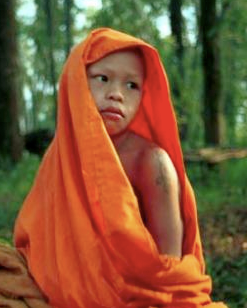 We have a new film at the Tricycle | Buddhafest Online Film Festival: Buddha’s Lost Children, directed by Mark Verkerk. The Tricycle team watched it together yesterday afternoon, and let me tell you, this one’s a good one. The film follows Thai boxer turned Buddhist monk Phra Khru Bah Neua Chai Kositto (Khru Bah, for short), as he takes young children from the fringes of Thai society into his monastery, saving them from a life of impoverishment or drug abuse. Focusing on three boys at the monastery, the film shows their transformation throughout a year under Khru Bah’s care.
We have a new film at the Tricycle | Buddhafest Online Film Festival: Buddha’s Lost Children, directed by Mark Verkerk. The Tricycle team watched it together yesterday afternoon, and let me tell you, this one’s a good one. The film follows Thai boxer turned Buddhist monk Phra Khru Bah Neua Chai Kositto (Khru Bah, for short), as he takes young children from the fringes of Thai society into his monastery, saving them from a life of impoverishment or drug abuse. Focusing on three boys at the monastery, the film shows their transformation throughout a year under Khru Bah’s care.
As a father-figure to these lost boys, it’s easy to imagine Khru Bah as a sweet and gentle monk. It is true that his kindness seems infinite, and more often than not he has a smile on his face. But make no mistake: this tattooed monk pulls no punches—literally—when things get out of hand.
I’ve seen this film twice now, and I love it for many reasons. One of these is that although the movie tugs on even the most bitterly brittle of heartstrings, it also challenges my notion of what true compassion is, and what a show of it looks like. As director Verkerk writes on the film’s official website,
Buddha’s Lost Children also explores the nature of compassion, and what it means to actually live by it. I wanted to find out how it worked, record the mechanics of it in action. In the West, compassion is often seen as a weakness, as something passive and debilitating. But to Khru Bah—a Rambo in robes who shattered for me the stereotype of the navel gazing monk—it has become the basis for action.
This is not a film about Buddhism, though the story has the potential to change the way many people think about Buddhism in the West. Buddhism is still commonly seen as promoting a purely passive, contemplative attitude to life (the stereotype of the navel-staring monk). This is thought to lead ultimately to a detachment and even indifference to the problems of the material world, and is therefore not fit to tackle many of the complex, practical problems we face.
Yet Khru Bah’s example clearly shows otherwise. He has translated the Buddhist ideal for infinite compassion and unconditional love into action. From his hilltop retreat he goes out into the surrounding hills where, often literally risking his life, he confronts the most serious problems facing his people. For many I think this dynamic view of Buddhism will be an eye-opener.
Watch the trailer below.
If you already have an Online Film Festival Pass, you can watch Buddha’s Lost Children HERE until July 1. Don’t have an online Film Festival Pass yet? Never fear, it’s not too late! Get one HERE.
P.S. Tomorrow, check back on the Tricycle blog for an exclusive interview with Buddha’s Lost Children director Mark Verkerk.
Thank you for subscribing to Tricycle! As a nonprofit, we depend on readers like you to keep Buddhist teachings and practices widely available.